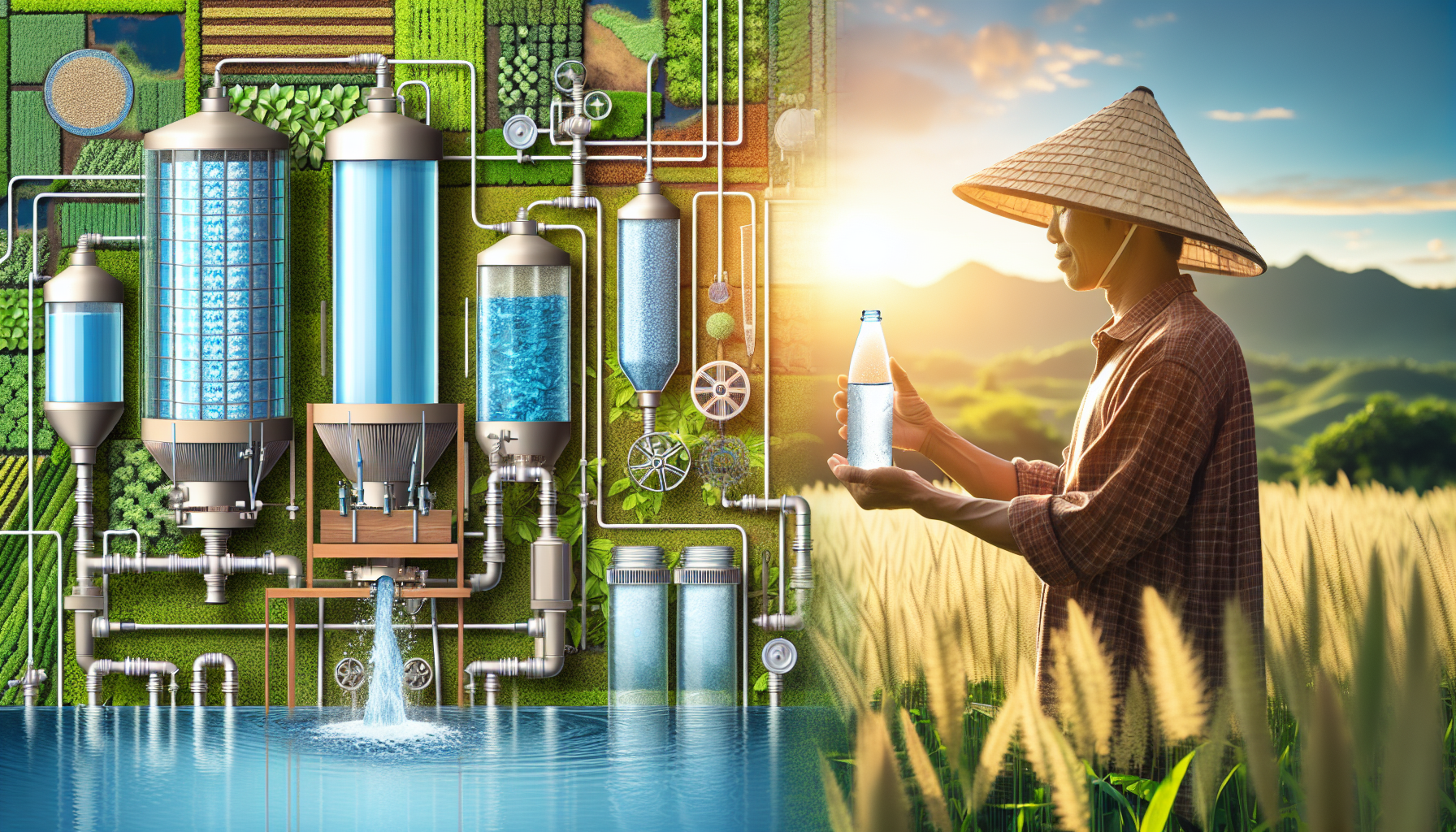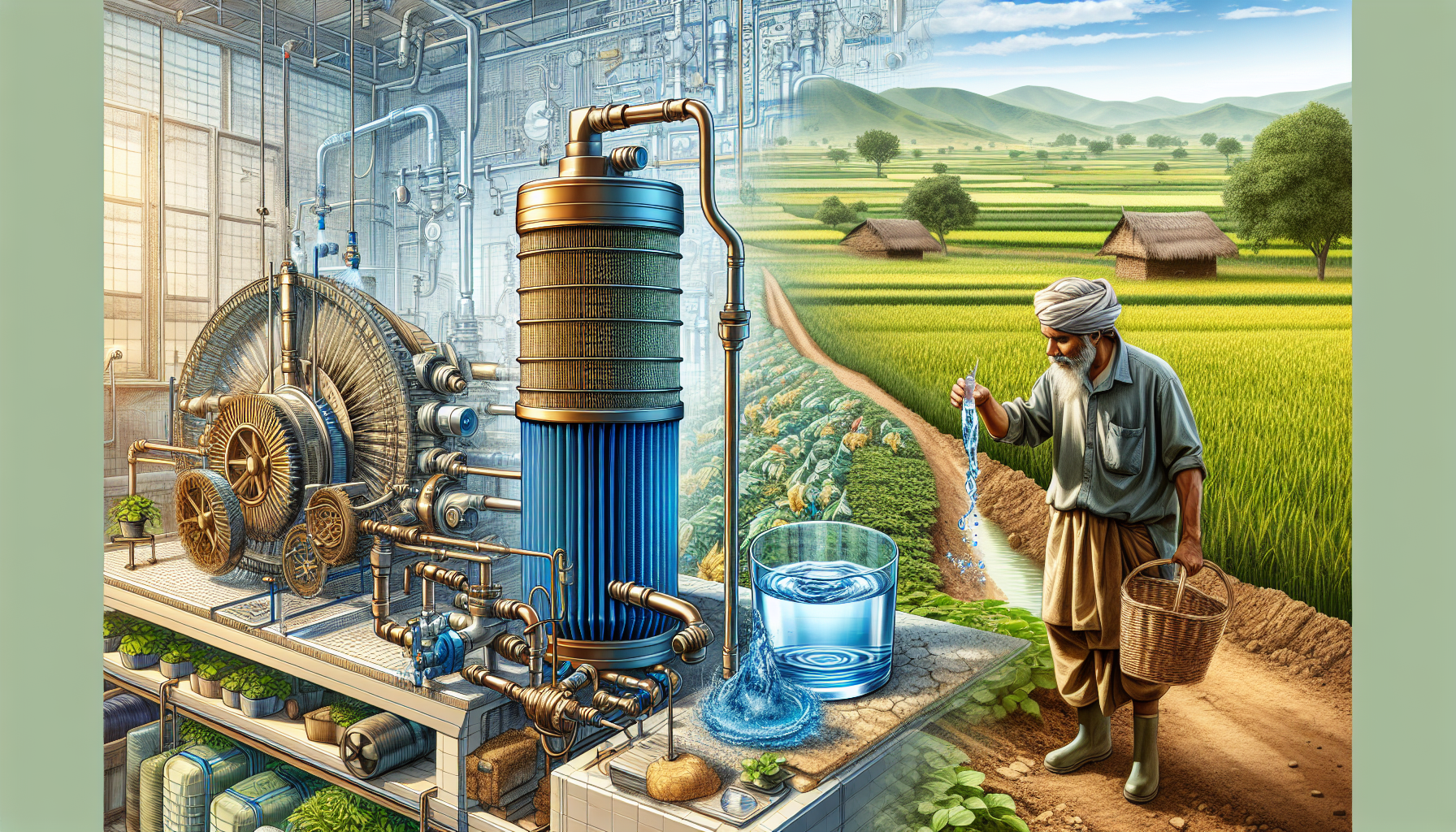In your search for guidance on well water treatment for agricultural contaminants, you may come across numerous publications that can provide the information you need. These publications offer valuable insights into the various methods and techniques of treating well water contaminated by agricultural activities. From scientific research papers to practical guides, these publications strive to equip you with the knowledge necessary to ensure the safety and quality of your well water. By exploring the information they offer, you can gain a deeper understanding of the challenges posed by agricultural contaminants and learn effective strategies to overcome them. Stay informed and take proactive steps towards ensuring the purity of your well water.
I. Overview of Well Water Treatment
A. Importance of Well Water Treatment
Well water treatment plays a crucial role in ensuring the safety and quality of drinking water sourced from wells. Many households and communities rely on well water as their primary source of drinking water, making it essential to address any potential contaminants. Agricultural contaminants, in particular, pose significant challenges due to their potential to enter groundwater through various pathways, such as run-off from agricultural fields or the improper disposal of agricultural chemicals. Therefore, well water treatment is vital to safeguard public health and prevent potential adverse effects from exposure to agricultural contaminants.
B. Challenges of Agricultural Contaminants in Well Water
Agricultural contaminants can be a diverse range of substances, including pesticides, fertilizers, herbicides, and animal waste. When these contaminants find their way into well water, they can present health risks to individuals who consume it. These contaminants may lead to long-term health problems, such as the accumulation of toxins in the body, hormonal disruptions, and even certain types of cancer. Furthermore, the presence of high levels of agricultural contaminants in well water can also impact the taste, odor, and overall aesthetic quality of the water, making it less desirable for domestic use.
C. Role of Publications in Providing Guidance
Publications play a crucial role in disseminating information and providing guidance on well water treatment for agricultural contaminants. They serve as valuable resources for individuals, communities, and professionals involved in water treatment and public health. These publications compile research, studies, and best practices from various sources to offer comprehensive guidance on the detection, prevention, and remediation of agricultural contaminants in well water. By accessing these publications, individuals can stay informed about the latest research, technologies, and methods available for ensuring the quality and safety of their well water.
II. Government Publications
A. Environmental Protection Agency (EPA)
The Environmental Protection Agency (EPA) is a prominent government agency responsible for protecting human health and the environment. The EPA publishes various documents, guidelines, and reports related to well water treatment for agricultural contaminants. Their publications provide information on federal regulations and standards, testing methodologies, and effective treatment techniques. By referring to the EPA publications, individuals can gain insights into the recommended practices for treating well water contaminated with agricultural substances.
B. United States Department of Agriculture (USDA)
The United States Department of Agriculture (USDA) focuses on agricultural practices, but it also addresses the impact of agriculture on water resources. The USDA develops publications that offer guidance on best practices for the prevention of water contamination from agricultural sources. These publications provide valuable information on sustainable farming techniques, proper handling and disposal of chemicals, and effective management practices to minimize the risk of agricultural contaminants reaching well water sources.
C. State Department of Agriculture Publications
State departments of agriculture also contribute to the availability of publications that focus on well water treatment for agricultural contaminants. These publications often address region-specific challenges and solutions and provide technical guidance for local farmers and residents. State-specific reports, fact sheets, and advice are particularly useful in understanding the unique agricultural practices and potential contaminants in a specific area. By consulting these publications, individuals can access localized information and tailor their well water treatment strategies accordingly.

III. Research Articles and Journals
A. Agricultural Engineering Research Journals
Agricultural engineering research journals publish studies and research related to various aspects of agricultural practices, including water management and contamination. These journals offer scientific insights into the different pathways through which agricultural contaminants enter well water and provide innovative approaches for their detection and removal. Peer-reviewed articles in these journals go through rigorous review processes, ensuring the credibility and reliability of the information presented.
B. Environmental Science and Technology Journals
Environmental science and technology journals delve into the interdisciplinary field of environmental sciences, including water quality and pollution. These journals often feature research articles that address the challenges posed by agricultural contaminants in well water. They explore issues related to contaminant transport, fate, and the development of treatment technologies. By keeping up with the latest findings and advancements in these journals, individuals can stay informed about emerging treatment methods and techniques for addressing agricultural contaminants.
C. Water Research Journals
Water research journals cover a broad spectrum of topics related to water resources, including water quality and treatment. These journals publish cutting-edge research on the removal of agricultural contaminants from well water, offering detailed analyses of treatment efficiency, cost-effectiveness, and practical applicability. Research articles in water research journals contribute to the scientific knowledge base and provide guidance for professionals in the field of water treatment.
IV. Non-Governmental Organization Publications
A. National Ground Water Association (NGWA)
The National Ground Water Association (NGWA) is a nonprofit organization dedicated to promoting responsible groundwater management and protection. NGWA publishes informative guides, reports, and technical resources related to well water treatment and agricultural contaminants. These publications provide practical guidance on well construction, proper sampling and testing techniques, and effective treatment methods specific to groundwater sources. NGWA publications are valuable resources for well owners, water treatment professionals, and policymakers alike.
B. American Water Works Association (AWWA)
The American Water Works Association (AWWA) focuses on advancements in safe and sustainable water management. AWWA publications cover various aspects of water treatment, including well water treatment for agricultural contaminants. Their publications provide an in-depth understanding of treatment technologies, regulatory compliance, and emerging trends in the industry. By consulting AWWA publications, individuals can access comprehensive and reliable information to enhance their well water treatment strategies.
C. Rural Community Assistance Partnership (RCAP)
The Rural Community Assistance Partnership (RCAP), a nonprofit organization, provides technical assistance and resources to rural communities across the United States. RCAP offers publications specifically tailored to the well water treatment needs of agricultural communities. These publications address the unique challenges faced by rural areas, such as limited resources and technological expertise. By utilizing RCAP publications, communities can gain practical guidance on cost-effective treatment options and community-wide well water management approaches.

V. University Research Centers and Extension Publications
A. Cooperative Extension Programs
Cooperative extension programs, commonly associated with universities, serve as valuable resources for agricultural communities and well owners. These programs produce publications that focus on water quality and well water treatment specific to agricultural areas. Cooperative extension publications offer practical guidance on prevention, testing, and treatment of agricultural contaminants in well water. By collaborating with local experts and leveraging university research, these publications provide tailored and effective solutions for well water treatment challenges.
B. Agricultural Research Centers
Agricultural research centers affiliated with universities conduct studies on various agricultural practices and their impact on environmental resources, including well water. Their publications offer insights into the potential contaminants associated with specific agricultural activities and identify effective treatment methods. By referring to publications from agricultural research centers, individuals can gain a deeper understanding of the specific contaminants prevalent in their region and implement appropriate treatment strategies.
C. University Department Publications
University departments specializing in water resources, environmental sciences, or public health often publish research papers, reports, and technical documents related to well water treatment for agricultural contaminants. These publications are valuable resources for researchers, professionals, and individuals seeking comprehensive information on water treatment methods, contaminant identification, and removal techniques. University department publications contribute to the scientific knowledge base and aid in the development of evidence-based well water treatment strategies.
VI. Case Studies and Success Stories
A. Examples of Successful Well Water Treatment for Agricultural Contaminants
Case studies highlighting successful well water treatment for agricultural contaminants provide practical examples and best practices for addressing specific contamination scenarios. These case studies showcase the effectiveness of different treatment techniques and the positive impact on well water quality. By studying these examples, individuals can learn from successful experiences and adapt proven strategies to their unique situations.
B. Real-Life Case Studies on Effective Remediation Techniques
Real-life case studies on effective remediation techniques present in-depth analyses of contamination issues and the corresponding treatment measures implemented. These case studies outline the challenges faced, the remediation approach employed, and the outcomes achieved. By examining the approaches taken to remediate agricultural contaminants in well water, individuals can gain insights into innovative and successful treatment methods.

VII. Industry Publications and Trade Magazines
A. Water and Wastewater Industry Magazines
Water and wastewater industry magazines cater to professionals in the water treatment and management sector. These publications often feature articles focusing on well water treatment for agricultural contaminants. They provide practical insights into the latest technologies, treatment plant designs, and case studies related to agricultural contamination. By accessing industry magazines, individuals can stay up-to-date with advancements in the field and gain practical knowledge applicable to their well water treatment efforts.
B. Agricultural and Farming Publications
Agricultural and farming publications may not primarily focus on water treatment but often address relevant topics related to agricultural contamination and water resources. These publications offer valuable information on sustainable farming practices, responsible chemical use, and innovative techniques to minimize contamination risks. Well owners can find useful guidance and recommendations in these publications to prevent or mitigate the introduction of agricultural contaminants into their wells.
C. Irrigation and Water Management Trade Journals
Irrigation and water management trade journals highlight practices and technologies related to efficient water use and management in agricultural contexts. While the primary focus is irrigation, these publications also address potential contamination issues associated with water sources, including wells. By referring to these trade journals, individuals can gain insights into water management techniques, filtration systems, and irrigation practices that reduce the risk of agricultural contaminants entering wells.
VIII. International Organizations and Publications
A. World Health Organization (WHO)
The World Health Organization (WHO) serves as a global authority on health-related matters, including water quality. WHO publications cover a wide range of topics, including well water treatment for agricultural contaminants. Their guidance documents provide globally recognized standards, best practices, and recommendations for the prevention and removal of agricultural contaminants from drinking water sources. WHO publications ensure a comprehensive and evidence-based approach to water treatment, valuable for both developed and developing countries.
B. Food and Agriculture Organization of the United Nations (FAO)
The Food and Agriculture Organization of the United Nations (FAO) addresses global challenges related to food and agriculture, recognizing the significant role of water resources. FAO publications offer insights into sustainable agriculture practices, water management techniques, and potential contamination risks to water sources. By accessing FAO publications, individuals can gain a global perspective on agricultural contamination issues and discover effective well water treatment strategies implemented around the world.
C. International Water Association (IWA)
The International Water Association (IWA) is an organization dedicated to promoting sustainable and equitable water management worldwide. IWA publications cover a broad range of water-related topics, including well water treatment for agricultural contaminants. These publications feature innovative approaches, case studies, and best practices from different regions and contexts. By referring to IWA publications, individuals can access globally shared knowledge and identify cutting-edge treatment technologies and strategies.

IX. Online Resources and Websites
A. Government Websites and Portals
Government websites and portals provide valuable online resources for individuals seeking information on well water treatment for agricultural contaminants. Websites maintained by agencies such as the EPA, USDA, and state departments of agriculture offer downloadable publications, fact sheets, and databases related to water treatment practices and regulatory requirements. These online resources provide convenient access to the latest information and recommendations.
B. Non-Profit Organization Websites
Non-profit organizations dedicated to water quality and environmental protection often maintain informative websites with resources related to well water treatment for agricultural contaminants. These websites offer publications, educational materials, and interactive tools to assist individuals in understanding potential contamination risks and implementing effective treatment strategies. By exploring these non-profit organization websites, individuals can access reliable and up-to-date information on well water treatment.
C. Online Communities and Forums
Online communities and forums related to water treatment, public health, and agriculture serve as platforms for knowledge sharing and discussion. These platforms allow individuals to seek advice, share experiences, and access recommendations from experts and peers. Participating in online communities and forums provides individuals with practical insights, personalized guidance, and potential solutions for the treatment of agricultural contaminants in well water.
X. Expert-Authored Books and Guides
A. Well Water Treatment Handbooks and Manuals
Expert-authored well water treatment handbooks and manuals comprehensively cover various topics related to well water treatment for agricultural contaminants. These books offer detailed explanations of water treatment processes, contaminant identification methods, and selection and operation of treatment systems. These resources bridge the gap between scientific research and practical applications, providing individuals with a comprehensive guide to effectively address agricultural contaminants in well water.
B. Guides on Agricultural Contaminant Removal Techniques
Guides specifically focused on agricultural contaminant removal techniques serve as valuable references for individuals dealing with contamination issues originating from farming activities. These guides outline a range of treatment techniques, such as filtration, oxidation, and disinfection, suitable for removing specific agricultural contaminants. By following the recommendations outlined in these guides, individuals can effectively target and remove the contaminants affecting their well water.
C. Technical Books on Water Quality Analysis
Technical books focusing on water quality analysis provide deeper insights into the analytical methods and techniques used to detect and quantify agricultural contaminants in well water. These books cover topics such as sample collection, laboratory analysis, and data interpretation. By enhancing their understanding of water quality analysis, individuals can take proactive measures to detect and monitor the presence of agricultural contaminants, allowing for timely and appropriate treatment interventions.
In conclusion, a wide range of publications and resources are available to guide individuals and communities in the treatment of well water contaminated with agricultural contaminants. These publications, including government documents, research articles and journals, non-governmental organization publications, university research centers, and industry publications, offer valuable insights, best practices, and case studies. By utilizing a combination of these resources and staying informed about the latest developments in well water treatment, individuals can safeguard their health and ensure the quality and safety of their well water supply.


